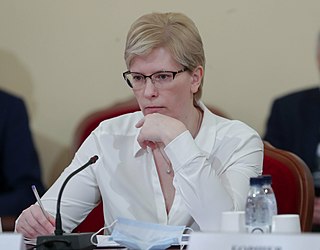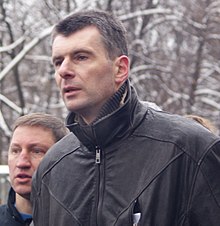
Sergey Vladilenovich Kiriyenko is a Russian politician who has served as First Deputy Chief of Staff of the Presidential Administration of Russia since 5 October 2016. He previously served as the 30th Prime Minister of Russia from 23 March to 23 August 1998 under President Boris Yeltsin, and was head of the Rosatom nuclear energy company between 2005 and 2016. Kiriyenko was the youngest Prime Minister of Russia, taking the position at age 35. Ideologically a technocrat, he has played a leading role in the governance of Russian-occupied territories of Ukraine since the Russian invasion of Ukraine.

Vladimir Olegovich Potanin is a Russian oligarch. He acquired his wealth notably through the controversial loans-for-shares program in Russia in the early to mid-1990s.

Vladimir Vladimirovich Kara-Murza is a Russian-British political activist, journalist, author, filmmaker, and former political prisoner. A protégé of murdered Russian dissident Boris Nemtsov, Kara-Murza is vice-chairman of Open Russia, an NGO founded by the exiled Russian businessman and former oligarch Mikhail Khodorkovsky, which promotes civil society and democracy in Russia. He was elected to the Coordinating Council of the Russian Opposition in 2012, and served as deputy leader of the People's Freedom Party from 2015 to 2016. He has directed two documentaries, They Chose Freedom and Nemtsov. As of 2021, he serves as Senior Fellow to the Raoul Wallenberg Centre for Human Rights. He was awarded the Civil Courage Prize in 2018.
Russian oligarchs are business oligarchs of the former Soviet republics who rapidly accumulated wealth in the 1990s via the Russian privatisation that followed the dissolution of the Soviet Union. The failing Soviet state left the ownership of state assets contested, which allowed for informal deals with former USSR officials as a means to acquire state property.

Mikhail Dmitrievich Prokhorov is a Russian oligarch and politician. He was also an owner of the Brooklyn Nets.

Boris Yefimovich Nemtsov was a Russian physicist, liberal politician, and outspoken critic of Vladimir Putin. Early in his political career, he was involved in the introduction of reforms into the Russian post-Soviet economy. In the 1990s under President Boris Yeltsin, he was the first governor of the Nizhny Novgorod Oblast (1991–1997). Later he worked in the government of Russia as Minister of Fuel and Energy (1997), Vice Premier of Russia and Security Council member from 1997 to 1998. In 1998, he founded the Young Russia movement. In 1998, he co-founded the coalition group Right Cause and in 1999, he co-formed Union of Right Forces, an electoral bloc and subsequently a political party. Nemtsov was also a member of the Congress of People's Deputies (1990), Federation Council (1993–97) and State Duma (1999–2003).

Alexei Leonidovich Kudrin is a Russian liberal politician and economist. Previously he served as the Chairman of the Accounts Chamber from 2018 to 2022 and as Minister of Finance from 2000 to 2011. Since December 9, 2022 Corporate Development Advisor at Yandex.

Dmitry Anatolyevich Medvedev is a Russian politician who has been serving as deputy chairman of the Security Council of Russia since 2020. Medvedev was also the third president of Russia from 2008 to 2012 and prime minister of Russia from 2012 to 2020.

Presidential elections were held in Russia on 2 March 2008 and resulted in the election of Dmitry Medvedev as the third President of Russia. Medvedev was elected for a four-year term with the support of incumbent president Vladimir Putin and five political parties, received 71% of the vote, and defeated Gennady Zyuganov of the Communist Party of the Russian Federation, and Vladimir Zhirinovsky of the Liberal Democratic Party of Russia.

Party of Growth was a liberal-conservative political party in Russia which had representatives in several local legislatures. Created in March 2016 on the basis of the Right Cause party, the party's main policy stances are liberal free market economy, democracy and protecting the rights of the middle class. The party has been led by Boris Titov since its founding. The party was a member of the pro-Putin All-Russia People's Front.
The People's Freedom Party, often known by its short form PARNAS, and formerly the Republican Party of Russia – People's Freedom Party, and initially Republican Party of Russia, was a liberal-democratic political party in Russia. It was one of the first opposition parties founded in the final years of the Soviet Union.

Presidential elections were held in Russia on 4 March 2012. There were five officially registered candidates: four representatives of registered parties, and one nominal independent. The election was the first one held after constitutional amendments were introduced in 2008, in which the elected president for the first time would serve a six-year term, rather than a four-year term.

Civic Platform is a conservative political party in Russia. The party was formed on 4 June 2012 by businessman and 2012 presidential candidate Mikhail Prokhorov.

The presidency of Dmitry Medvedev began on 8 May 2008, when he became the 3rd President of the Russian Federation. Medvedev was the Head of the Presidential Administration during the 2nd term of Vladimir Putin as president, and the Chairman of Gazprom oil company. Dmitry Medvedev was the youngest Russian leader since 1918 at the time of his inauguration.
Right Cause (PD), officially the All-Russian Political Party “Right Cause”, was an officially registered centre-right Russian political party that existed from 2008 to 2016. It was created from the merger of three parties: Civilian Power, the Democratic Party of Russia (DPR), and the Union of Right Forces, and it declared itself liberal.

Leonid Yakovlevich Gozman is an Israeli-Russian politician who served as the president of the Union of Right Forces.

In 2010, after the long-standing mayor of Moscow Yuri Luzhkov's resignation, then-President of Russia Dmitry Medvedev appointed Sergey Sobyanin for a five-year term. After the protests sparked in December 2011, Medvedev responded to that by a series of measures supposed to make political power more dependent on voters and increase accessibility for parties and candidates to elections; in particular, he called for re-establishing elections of heads of federal subjects of Russia, which took effect on June 1, 2012. On February 14, 2013, Sobyanin declared the next elections would be held in 2015, and a snap election would be unwanted by Muscovites, and on March 1, he proclaimed he wanted to run for a second term as a mayor of Moscow in 2015.
The 2012 presidential campaign of Vladimir Putin, second and fourth President of Russia, was announced on 24 September 2011, at the United Russia party convention for the legislative election.
The Boris Nemtsov 2008 presidential campaign was the campaign of Boris Nemtsov in the 2008 Russian presidential election.

Marina Alekseyevna Litvinovich is a Russian opposition activist and politician.

















